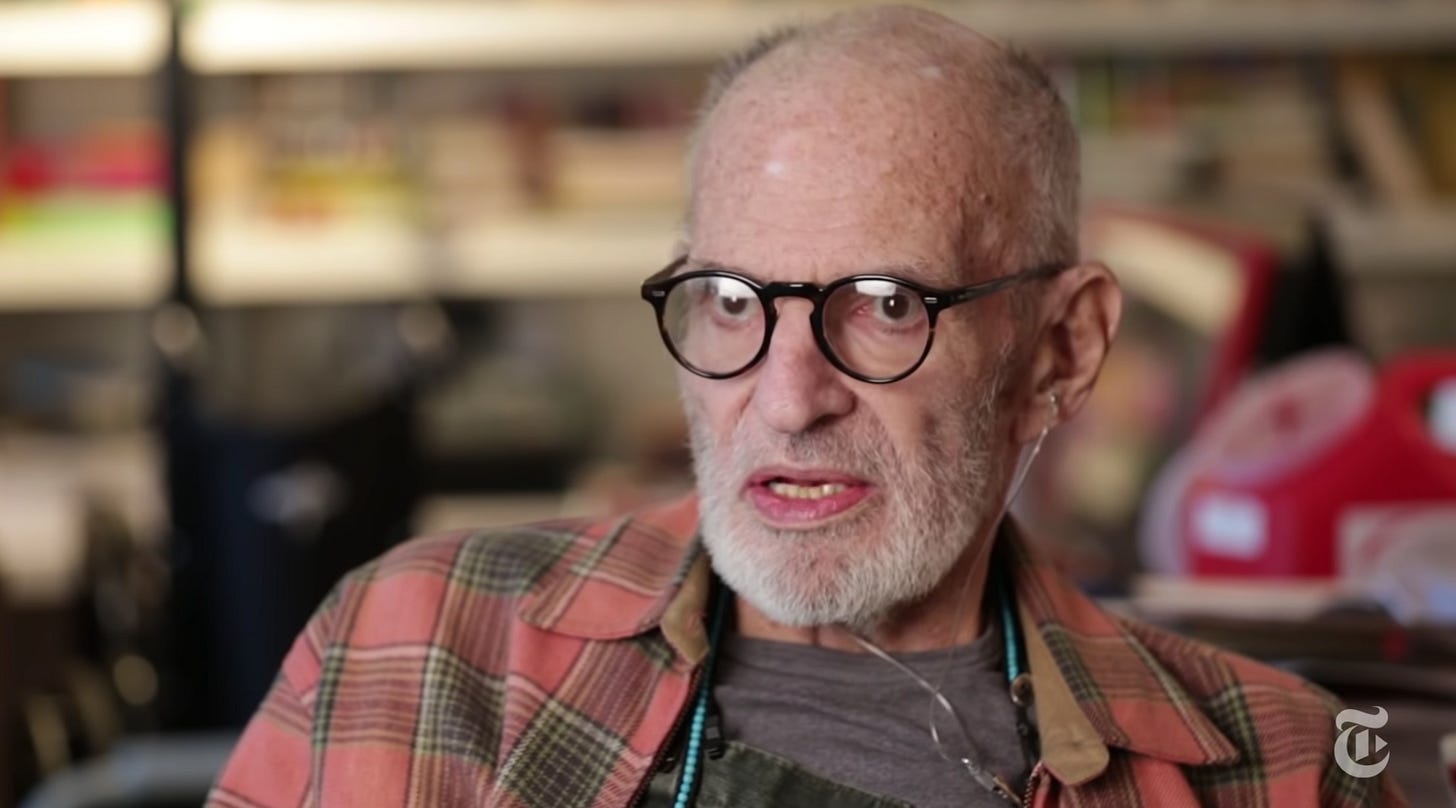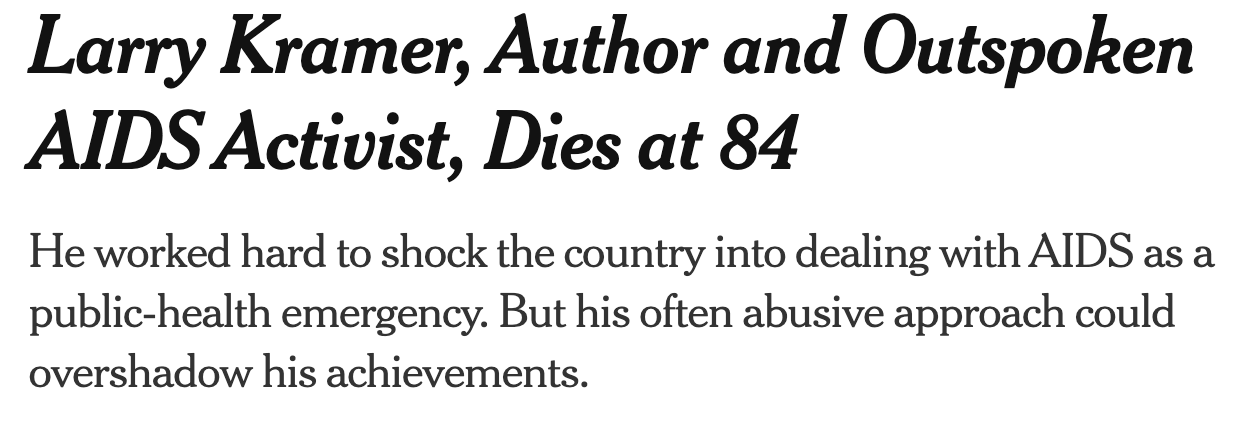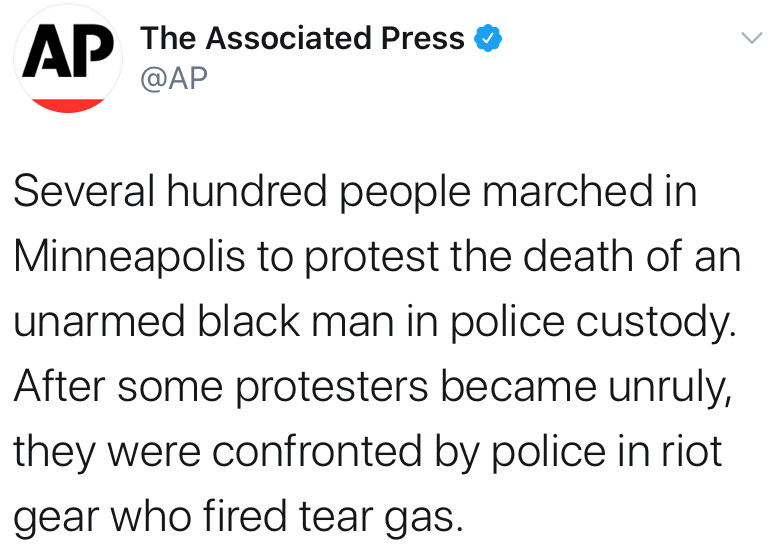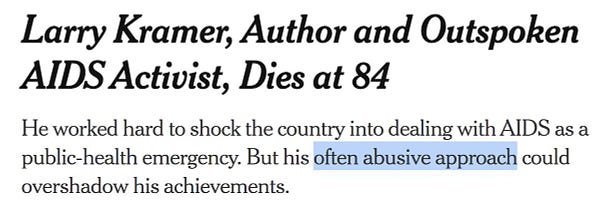The New York Times Still Doesn’t Get It
Not even death will stop the elite media from policing the boundaries of protest.

Larry Kramer, the legendary AIDS activist, playwright, and novelist, died on Wednesday at 84. He died on Henry Kissinger’s 97th birthday, as if to underscore the injustice in the world.
The New York Times was right out of the gate with an extensive obituary for Kramer, as befits a man of his stature. The obituary was mostly laudatory, but many people noticed something off right at the top. See if you can spot it:

“His often abusive approach,” eh? There’s that New York Times balance we’ve come to know and love: Larry Kramer did good things, BUT…
Here is a representative example of the reaction this wording received:
It’s clear to see why. I’m not here to pretend that Larry Kramer was a cuddly puppy dog. He was a notoriously abrasive character, made scads of enemies, and generated controversy all his life. But, as with all civil rights movements, the AIDS movement—one of the most electrifying, courageous, and righteous struggles of the 20th century—made the impact it did precisely because Kramer and so many others were not afraid to be angry. ACT UP, the organization Kramer helped found in 1987, constantly shocked and dismayed polite society with the militancy and audacity of its protests. (The Times has acknowledged this before.) It also got results. That is how change happens. To reduce something so potent and sacred as the rage that Kramer and the rest of the AIDS movement brought to their fight to an “abusive approach” is an insult to their memory.
Equally galling was the prime example that the Times—which, it should be noted, was a notoriously homophobic institution whose coverage of AIDS and LGBT people in the 1980s has dogged the paper ever since—used to illustrate Kramer’s lack of politesse:
Mr. Kramer enjoyed provocation for its own sake — he once introduced Mayor Edward I. Koch of New York to his pet wheaten terrier as the man who was “killing Daddy’s friends” — and this could sometimes overshadow his achievements as an author and social activist.
I’m sorry, but confronting Ed Koch about AIDS is not “provocation for its own sake.” The list of people who ignored the AIDS crisis and left its mostly queer victims to die is long, but Koch certainly earned his place. Why should he be exempt from having to answer for his actions?
The Times eventually changed the wording in its headline—it now reads “confrontational”—but not the underlying sentiment, which feels like a pretty meaningless shift.
As it happens, the Kramer fracas came hours after the Associated Press tweeted this about protests in Minneapolis on Tuesday following the police killing of George Floyd:

“After some protesters became unruly.” What a phrase. “Unruly” is such a telling, aristocratic word, with its implication that the plebs are getting a little out of hand and need to be shut down. The protesters, let us not forget, were in the streets because police officers murdered yet another black man in America. They were angry because America is a place that inspires anger. To the Associated Press, that is “unruly.” To many others, it might merely seem just.
Both the Times and the AP are operating on the same assumption here: To get truly mad, or even “aggressive,” about the everyday horrors of the United States is to step out of line, to become as problematic as the injustices themselves, to raise questions about how far is too far. Even death is not a barrier to the policing of these kinds of boundaries.
Update, 8:39 p.m. ET: The Times has changed the headline on its obituary yet again, and has finally done away entirely with its previous framing. The text now reads, “He sought to shock the country into dealing with AIDS as a public-health emergency and foresaw that it could kill millions regardless of sexual orientation.” This is better, but it still feels kind of…weird to memorialize such a specifically gay icon by highlighting his warnings to people “regardless of sexual orientation.”







“To get truly mad, or even ‘aggressive,’ about the everyday horrors of the United States is to step out of line[.]”
This is what has taken hold in our post-9/11 society, and it needs to be talked about more. Thanks for this.